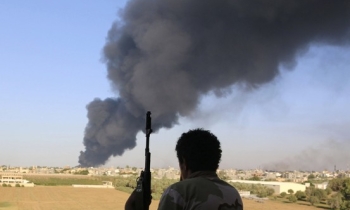The British government has threatened editors with prosecution under the Official Secrets Act if they publish further details from a top secret memo that records US President George W Bush's intention of bombing the headquarters of Arab TV station Aljazeera in Qatar. This has been flayed far and wide.

This is first time the Tony Blair government has threatened newspapers in this way. Though it has obtained court injunctions against newspapers, the government has never prosecuted editors for publishing contents of leaked documents, including highly sensitive ones about the run-up to the invasion of Iraq.
"Publication of a document that has been unlawfully disclosed by a Crown servant could be in breach of Section 5 of the Official Secrets Act," Goldsmith warned newspaper editors. Goldsmith also threatened to take out an immediate High Court injunction unless the Mirror confirmed that it would not publish further details.
The Daily Mirror has been a particular target because it published a front-page exclusive on the memo under the headline "Bush plot to bomb his ally," on Tuesday. According to the newspaper, the five-page memo was a secret minute of a conversation held between Bush and Prime Minister Tony Blair on April 16, 2004.
The meeting took place during a major US offensive against the Iraqi city of Fallujah, whose 300, 000 civilians were placed under military siege. The minute is alleged to record a threat by Bush to unleash "military action" against Aljazeera's head offices, which are in Doha, the capital of Qatar, then host to US military headquarters. According to the Mirror, Blair managed to dissuade Bush from taking such action.
On Wednesday, the Mirror said it had agreed to abide by the gagging orders. "We have essentially agreed to comply," the paper said. Editor Richard Wallace said: "We made No 10 (Downing Street � the official residence of the British prime minister) fully aware of the intention to publish and were given 'no comment' officially or unofficially. Suddenly 24 hours later we are threatened under section 5 (of the Secrets Act)."

Labour MP Peter Kilfoyle criticised the move and said, "In my view I can see no other explanation for this than an overwhelming desire to placate President Bush and prevent him from being embarrassed." Kilfoyle has tabled a motion calling on the government to publish the record of the conversation.
Rejecting suggestions that any comment by Bush mooting an attack on Aljazeera was made as a joke, Kilfoyle said, "There was an attack on the hotel in Baghdad used by Aljazeera journalists which caused great controversy. The US also attacked a Serbian TV station [during the Kosovo war]. It is easy to dismiss this as a glib comment, but I don't find it very funny at all."
For its part, Aljazeera said it is looking into the report. In a statement on Tuesday, Aljazeera said it "maintains a set of journalistic practices built on being fair, impartial, and balanced, and as is the standard practice with every story, Aljazeera is going through a due diligence process of verifying the details of the Daily Mirror report".
The statement added: "Before making any conclusions Aljazeera needs to be absolutely sure regarding the authenticity of the memo and would hope for a confirmation from Downing Street as soon as possible. If the report is correct then this would be both shocking and worrisome not only to Aljazeera but to media organisations across the world."
"We sincerely urge both White House and Downing Street to challenge the Daily Mirror report and in the event that the memo is found to be accurate it would be incumbent on them to explain their positions on statements regarding the deliberate targeting of journalists and news organisations," Aljazeera said.
The New York based Committee to Protect Journalists (CPJ) said, "This is a very serious charge with grave implications for the safety of media professionals. President Bush and Prime Minister Blair should at once set the record straight about what was said or not said during their April 2004 meeting." CPJ executive director Ann Cooper said, "Refusing to address these reports in a substantive way only fuels suspicions."

Paris-based Reporters sans Frontières (RSF) said, "We find it hard to believe that President Bush really discussed this possibility. This would be extremely serious and would constitute a major and unprecedented violation of the right to information. Bombing any news organisation, especially in time of peace, would be incomprehensible and unacceptable. If this report turns out to be true, it offers a new insight into the motives of the US forces, which have already bombed Al-Jazeera offices twice, in Afghanistan and Iraq."
RSF also came down heavily on the Blair government's reaction to the news report, "We are also shocked by the British government's decision to ban the British press from publishing any information about the content of this memo, classified 'top secret.' Invoking the 1989 Official Secrets Act and threatening to take newspapers to court is disturbing in a country that is usually careful to respect press freedom."
The Guardian asked, "To what lengths will politicians stoop in order to prevent the press from providing the public with information concerning the consequences of political action?" Edgar Forbes wrote in the paper: "Lord Goldsmith's unequivocal gag reinforces the message that press freedom will only be tolerated insofar as it does not conflict with the political process. To the extent that he has chosen to caution the media, it is appropriate that the media question whether such caution is based on his political position or his legal opinion. The two have already been called into question in relation to his advice over the war in Iraq.
"Legal process is being used to place a smokescreen over information the public has a legitimate interest in knowing about. While cases involving civil servants being charged with breaches of the Official Secrets Act are not extraordinary, and injunctions to restrain the press from publishing confidential information are not unusual, linking these actions to provide a two-pronged attack on press freedom is a worrying departure from the norm."

The Guardian went on to say in an editorial, "If it were true that the prime minister had managed to stop the bombing of al-Jazeera's Qatar HQ, it would be a rare, perhaps unique, example of him winning an argument with the president. If so, that's a compelling reason to publish this secret memo, reveal the truth of this extraordinary tale – and drop an ill-advised prosecution."
Meanwhile, Qataris, including senior officials, have reacted with shock. "I thought this was just a rumour, but now the UK has used the [threat of the] secrecy act to stop it, it raises more questions. It makes this high profile and we would be really interested to know what is going on," a senior member of the ruling Al-Thani family was quoted as saying in Financial Times.
Jeremy Scahill wrote in The Nation, "What is needed now is for a British newspaper or magazine to publish the memo for all the world to see – and if they face legal action, they should be backed up by every major media organisation in the world. If true, Bush's threat is a bold confirmation of what many journalists already believe: that the Bush administration views us all as enemy combatants."









